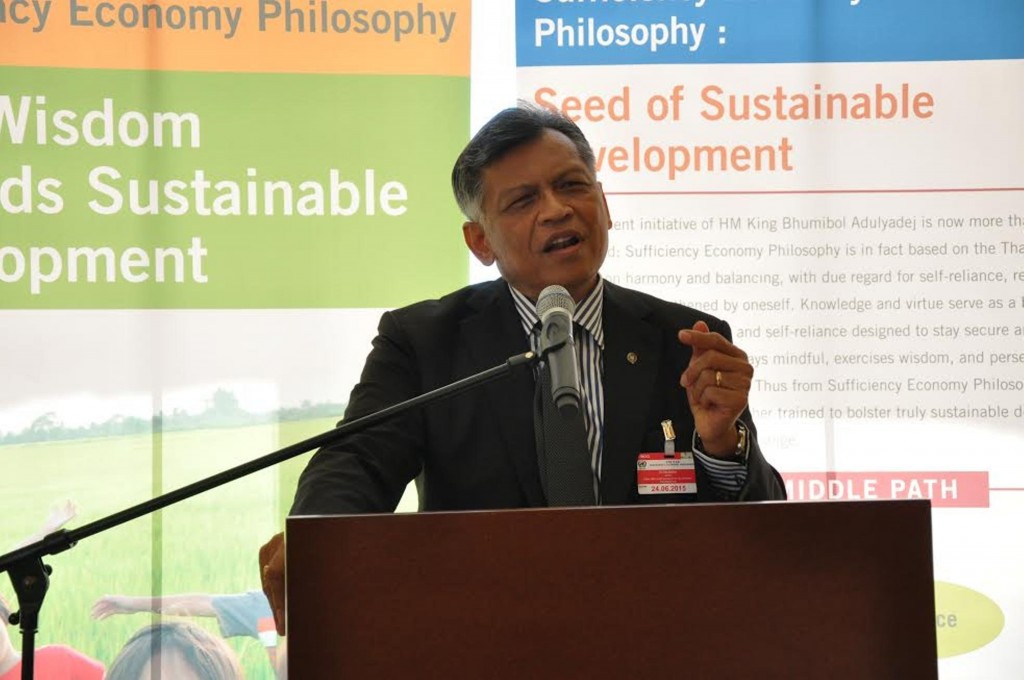16 Jul 2015
Ex-ASEAN Secretary-General urges U.N. to adopt King Bhumibhol’s “Sufficiency Economy” as development model
Geneva/Paris July 2015 (TSDF media release): – Dr. Surin Pitsuwan, President of Future Innovative Thailand Institute (FIT), and a former ASEAN Secretary-General and Foreign Minister of Thailand, recently addressed audiences at UNCTAD Geneva and UNESCO Paris highlighting His Majesty King Bhumibhol’s Sufficiency Economy Philosophy (SEP) amidst Globalization and application of this Philosophy in Cultures and Values towards Sustainable Development.
 Dr Surin Pitsuwan |
The topic of the luncheon talk at UNCTAD (United Nations Conference on Trade and Development) Geneva was “Sufficiency Economy Philosophy: Complement or Against Globalization in Reaching Sustainable Development” with focus on trade. The event was the result of a collaboration between the Permanent Mission of Thailand, Geneva, and Thailand Sustainable Development Foundation (TSDF).
At the UNESCO (United Nations Educational, Scientific and Cultural Organisation) session in Paris, organized by the Royal Thai Embassy, Paris and TSDF, education was highlighted. Dr. Surin’s talk on “Sufficiency Economy Philosophy: Culture & Values Towards Sustainable Development” was followed by the viewing of an exhibition titled “Cultivating a Sufficiency-Mindset in the Schools”, organized by the Royal Thai Embassy, Paris, featuring examples of Sufficiency Economy Philosophy (SEP) success stories applied at schools throughout Thailand.
At the UNCTAD talk, Dr. Surin disclosed, “His Majesty the King of Thailand has been preaching to better moderate your desire, better maintain your own consumption within means, better build your own family economy of finance against your own productivity. His Majesty called this thing Sufficiency Economy Philosophy. It is one modality of many communities and states and countries around the world looking for an alternative way of moving forward in the process of globalization”.
“In Thailand we are following this Sufficiency Economy Philosophy in a very conscientious way. We have found out that if we help the local communities, villages, to learn more about this very approach we can help them get out of debt, produce more, manage their own affairs more at the local level, and have surpluses to share, sell, trade with their adjacent communities and in the nation and of course, enough for export. The rice that you have tasted came from these kind of approaches from this kind of communities,” Dr. Surin informed the captive audience.
“At the local level, sufficiency economy starts with self productivity and self help, but also goes on to work on their moral ethical dimensions and that will reduce conflicts and unemployment in the village. We employ the youth and women in those villages.”
Dr. Surin suggested that UNCTAD look into the Sufficiency Economy Philosophy modality for collective survivability, of running this world, of sharing the resources of this world, of distributing the fruits of the growth of this world. “I know that UNCTAD’s mission is to make sure that there is a balance of this growth, to find that new balance in managing global economy.”
“Sufficiency economy is just the beginning; and it will have to go on. It will not stop at the sufficiency self-level, it is not anti-trade, not anti-growth, not anti-globalization, but it is preparing our people for better participation in that globalization process. I submit this for your consideration,” concluded Dr. Surin in his address at UNCTAD Geneva.
At UNESCO Paris event, which took place five days apart from the UNCTAD Geneva session, the focus of Dr. Surin’s address was on education and how Sufficiency Economy Philosophy is being integrated into schools and their curriculum in Thailand.
“Sufficiency Economy Philosophy is derived from the depth of the experience of the people, articulated by an enlightened monarch who has seen the way in which people face problems, manage problems, survive problems, working effectively by the crisis and problems,” said Dr. Surin. “I know UNESCO has a specific role to play and that is to help achieve cultural peace via education, to help achieve sustainable development through culture, science, and to somehow bring many of these different ideas and initiatives from around the world for the benefit of all mankind. And that is a major responsibility of UNESCO and all the members of UNESCO.”
“Thailand’s Sufficiency Economy Philosophy is one contribution I submit to you ladies and gentlemen,” Dr. Surin said to the audience. “It deserves your serious attention. Study it, criticize it, and if it needs some improvement by all means, but it is one way for the future, complementing, not against the sustainable development that we are going through now.”
Dr. Surin further elaborated,“14,000 schools in Thailand are experimenting with this approach. They grow their own vegetables, chicken, pigs, raise their own fruits, and students bring their lessons that they learn to their parents. The parents are asked: “Why do you gamble, why do you consume alcohol? Why do you not think about us and our future?” It is an experiment that is exciting.”
“Big businesses are helping because they know that this is one way to eradicate poverty that we have been trying to do. This is one way to conserve the environment, get out of debt, and prevent conflicts. Diplomats are being invited to see. You too should come and see for yourselves and you will not be disappointed,” concluded Dr. Surin.
Dr. Pitsuwan, 66, is “President of Future Innovative Thailand Institute (FIT), a former Secretary-General of ASEAN (2008-2012) and a former Foreign Minister of Thailand (1997-2001).”
The afternoon session also featured UNESCO’s Mrs. Ana Luiza Thompson-Flores, Assistant Director-General of the Bureau of Strategic Planning, who gave an interesting speech on “Role of National Cultures in Sustainable Development” in which she elaborated on the importance of preserving and promoting culture as a way to maintain self identity, social cohesion and even generate revenue within countries.
